Assessing the Role of Accounting in Business Performance and Growth
VerifiedAdded on 2022/11/25
|10
|2194
|105
Report
AI Summary
This report provides a comprehensive literature review assessing the importance of accounting in business processes. It begins with an introduction highlighting accounting's crucial role in organizational success through summarizing, analyzing, and utilizing financial information. The aim is to evaluate accounting's significance in business, drawing on secondary data sources like articles, books, and journals. The literature review explores various perspectives on accounting, including its role in tracking operational activities, making strategic decisions, providing reliable information to stakeholders, and enabling cost control. The review also addresses accounting standards, principles, and the benefits of implementing accounting in organizations, such as improved financial planning and legal compliance. However, it also acknowledges limitations, such as potential for biased information and the need for coordination with auditing. The report concludes that accounting is essential for gaining a competitive advantage, offering recommendations for its systematic implementation and continuous improvement. The references section lists the sources used in the review, including books and journals.
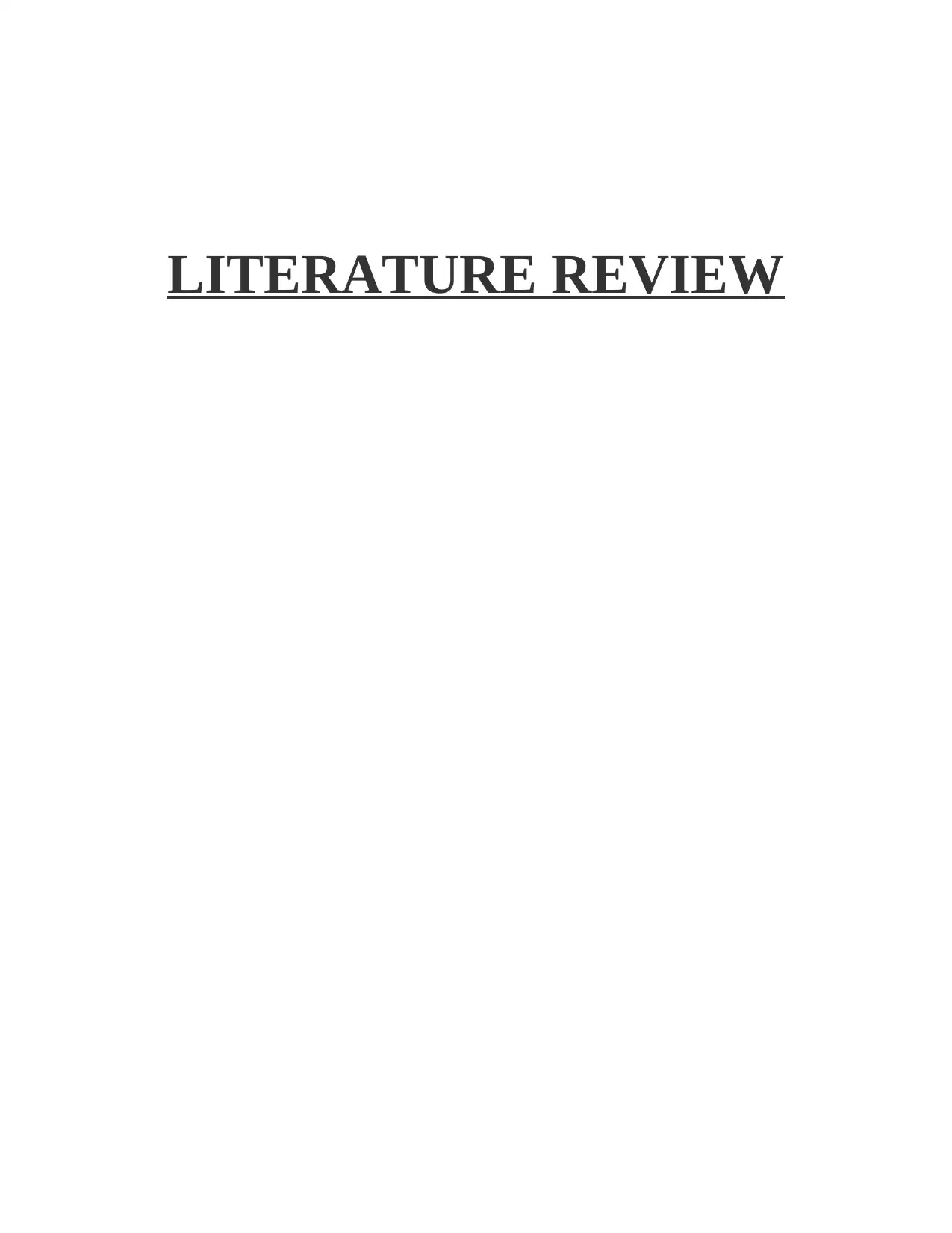
LITERATURE REVIEW
Paraphrase This Document
Need a fresh take? Get an instant paraphrase of this document with our AI Paraphraser

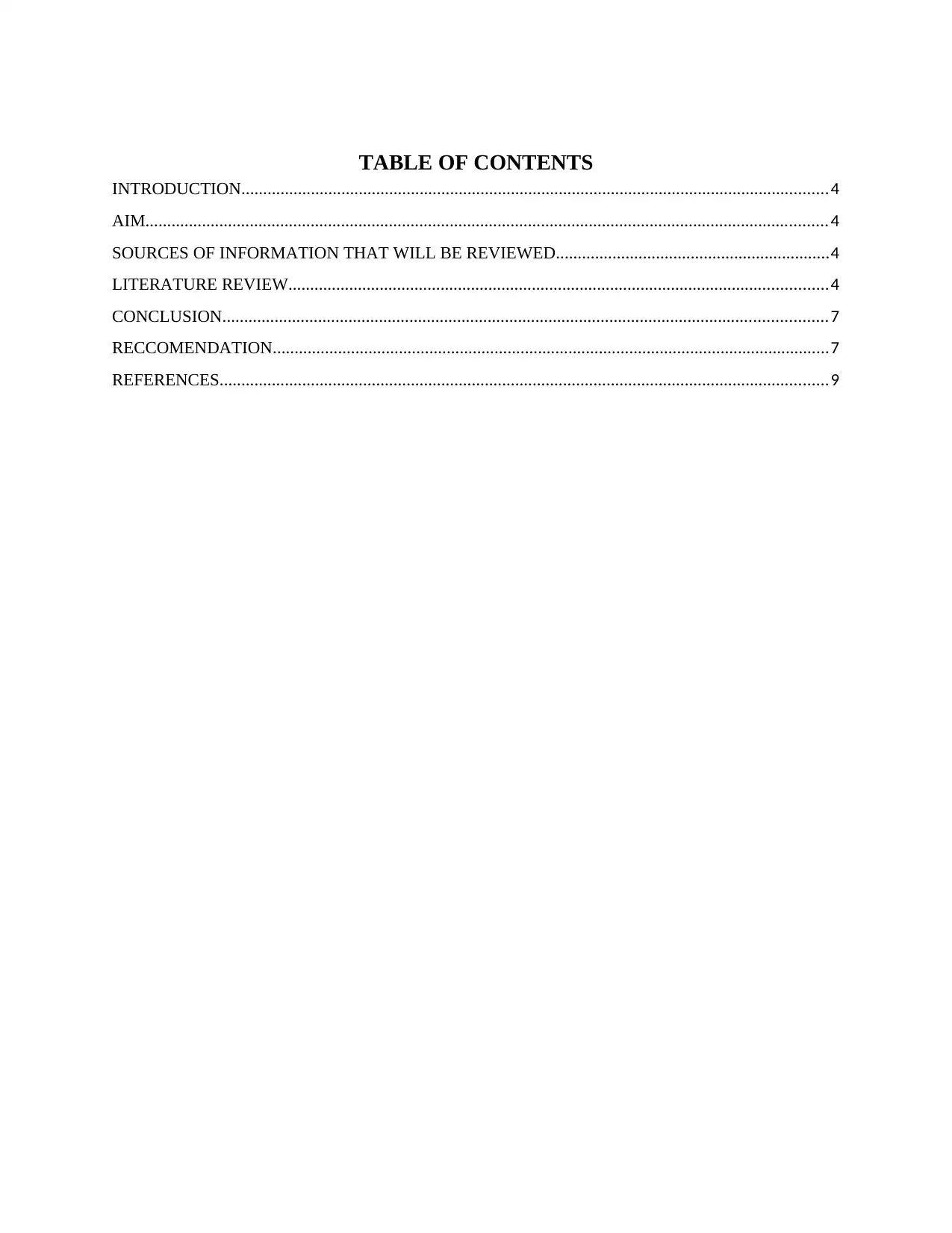
TABLE OF CONTENTS
INTRODUCTION.......................................................................................................................................4
AIM.............................................................................................................................................................4
SOURCES OF INFORMATION THAT WILL BE REVIEWED...............................................................4
LITERATURE REVIEW............................................................................................................................4
CONCLUSION...........................................................................................................................................7
RECCOMENDATION................................................................................................................................7
REFERENCES............................................................................................................................................9
INTRODUCTION.......................................................................................................................................4
AIM.............................................................................................................................................................4
SOURCES OF INFORMATION THAT WILL BE REVIEWED...............................................................4
LITERATURE REVIEW............................................................................................................................4
CONCLUSION...........................................................................................................................................7
RECCOMENDATION................................................................................................................................7
REFERENCES............................................................................................................................................9
You're viewing a preview
Unlock full access by subscribing today!
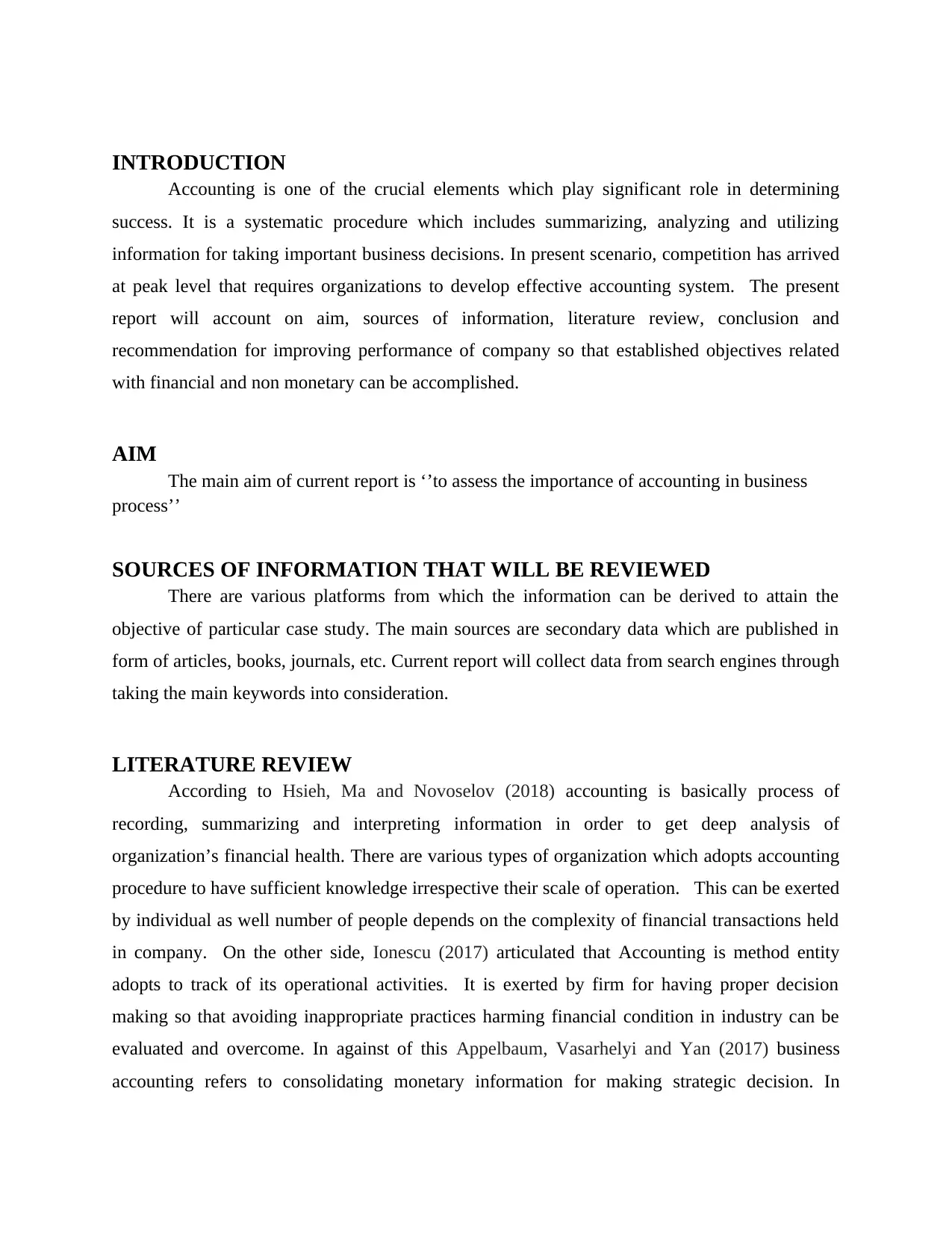
INTRODUCTION
Accounting is one of the crucial elements which play significant role in determining
success. It is a systematic procedure which includes summarizing, analyzing and utilizing
information for taking important business decisions. In present scenario, competition has arrived
at peak level that requires organizations to develop effective accounting system. The present
report will account on aim, sources of information, literature review, conclusion and
recommendation for improving performance of company so that established objectives related
with financial and non monetary can be accomplished.
AIM
The main aim of current report is ‘’to assess the importance of accounting in business
process’’
SOURCES OF INFORMATION THAT WILL BE REVIEWED
There are various platforms from which the information can be derived to attain the
objective of particular case study. The main sources are secondary data which are published in
form of articles, books, journals, etc. Current report will collect data from search engines through
taking the main keywords into consideration.
LITERATURE REVIEW
According to Hsieh, Ma and Novoselov (2018) accounting is basically process of
recording, summarizing and interpreting information in order to get deep analysis of
organization’s financial health. There are various types of organization which adopts accounting
procedure to have sufficient knowledge irrespective their scale of operation. This can be exerted
by individual as well number of people depends on the complexity of financial transactions held
in company. On the other side, Ionescu (2017) articulated that Accounting is method entity
adopts to track of its operational activities. It is exerted by firm for having proper decision
making so that avoiding inappropriate practices harming financial condition in industry can be
evaluated and overcome. In against of this Appelbaum, Vasarhelyi and Yan (2017) business
accounting refers to consolidating monetary information for making strategic decision. In
Accounting is one of the crucial elements which play significant role in determining
success. It is a systematic procedure which includes summarizing, analyzing and utilizing
information for taking important business decisions. In present scenario, competition has arrived
at peak level that requires organizations to develop effective accounting system. The present
report will account on aim, sources of information, literature review, conclusion and
recommendation for improving performance of company so that established objectives related
with financial and non monetary can be accomplished.
AIM
The main aim of current report is ‘’to assess the importance of accounting in business
process’’
SOURCES OF INFORMATION THAT WILL BE REVIEWED
There are various platforms from which the information can be derived to attain the
objective of particular case study. The main sources are secondary data which are published in
form of articles, books, journals, etc. Current report will collect data from search engines through
taking the main keywords into consideration.
LITERATURE REVIEW
According to Hsieh, Ma and Novoselov (2018) accounting is basically process of
recording, summarizing and interpreting information in order to get deep analysis of
organization’s financial health. There are various types of organization which adopts accounting
procedure to have sufficient knowledge irrespective their scale of operation. This can be exerted
by individual as well number of people depends on the complexity of financial transactions held
in company. On the other side, Ionescu (2017) articulated that Accounting is method entity
adopts to track of its operational activities. It is exerted by firm for having proper decision
making so that avoiding inappropriate practices harming financial condition in industry can be
evaluated and overcome. In against of this Appelbaum, Vasarhelyi and Yan (2017) business
accounting refers to consolidating monetary information for making strategic decision. In
Paraphrase This Document
Need a fresh take? Get an instant paraphrase of this document with our AI Paraphraser
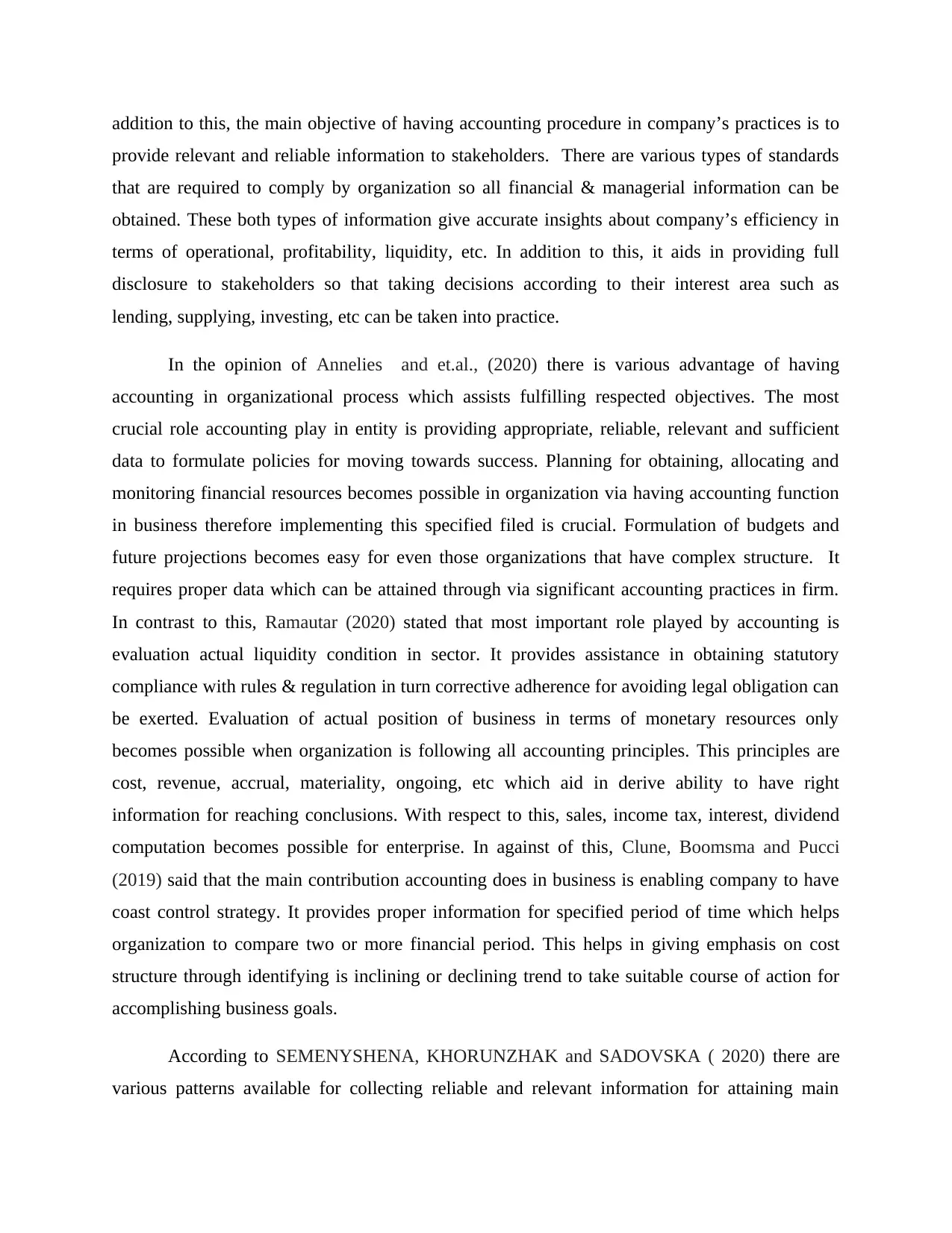
addition to this, the main objective of having accounting procedure in company’s practices is to
provide relevant and reliable information to stakeholders. There are various types of standards
that are required to comply by organization so all financial & managerial information can be
obtained. These both types of information give accurate insights about company’s efficiency in
terms of operational, profitability, liquidity, etc. In addition to this, it aids in providing full
disclosure to stakeholders so that taking decisions according to their interest area such as
lending, supplying, investing, etc can be taken into practice.
In the opinion of Annelies and et.al., (2020) there is various advantage of having
accounting in organizational process which assists fulfilling respected objectives. The most
crucial role accounting play in entity is providing appropriate, reliable, relevant and sufficient
data to formulate policies for moving towards success. Planning for obtaining, allocating and
monitoring financial resources becomes possible in organization via having accounting function
in business therefore implementing this specified filed is crucial. Formulation of budgets and
future projections becomes easy for even those organizations that have complex structure. It
requires proper data which can be attained through via significant accounting practices in firm.
In contrast to this, Ramautar (2020) stated that most important role played by accounting is
evaluation actual liquidity condition in sector. It provides assistance in obtaining statutory
compliance with rules & regulation in turn corrective adherence for avoiding legal obligation can
be exerted. Evaluation of actual position of business in terms of monetary resources only
becomes possible when organization is following all accounting principles. This principles are
cost, revenue, accrual, materiality, ongoing, etc which aid in derive ability to have right
information for reaching conclusions. With respect to this, sales, income tax, interest, dividend
computation becomes possible for enterprise. In against of this, Clune, Boomsma and Pucci
(2019) said that the main contribution accounting does in business is enabling company to have
coast control strategy. It provides proper information for specified period of time which helps
organization to compare two or more financial period. This helps in giving emphasis on cost
structure through identifying is inclining or declining trend to take suitable course of action for
accomplishing business goals.
According to SEMENYSHENA, KHORUNZHAK and SADOVSKA ( 2020) there are
various patterns available for collecting reliable and relevant information for attaining main
provide relevant and reliable information to stakeholders. There are various types of standards
that are required to comply by organization so all financial & managerial information can be
obtained. These both types of information give accurate insights about company’s efficiency in
terms of operational, profitability, liquidity, etc. In addition to this, it aids in providing full
disclosure to stakeholders so that taking decisions according to their interest area such as
lending, supplying, investing, etc can be taken into practice.
In the opinion of Annelies and et.al., (2020) there is various advantage of having
accounting in organizational process which assists fulfilling respected objectives. The most
crucial role accounting play in entity is providing appropriate, reliable, relevant and sufficient
data to formulate policies for moving towards success. Planning for obtaining, allocating and
monitoring financial resources becomes possible in organization via having accounting function
in business therefore implementing this specified filed is crucial. Formulation of budgets and
future projections becomes easy for even those organizations that have complex structure. It
requires proper data which can be attained through via significant accounting practices in firm.
In contrast to this, Ramautar (2020) stated that most important role played by accounting is
evaluation actual liquidity condition in sector. It provides assistance in obtaining statutory
compliance with rules & regulation in turn corrective adherence for avoiding legal obligation can
be exerted. Evaluation of actual position of business in terms of monetary resources only
becomes possible when organization is following all accounting principles. This principles are
cost, revenue, accrual, materiality, ongoing, etc which aid in derive ability to have right
information for reaching conclusions. With respect to this, sales, income tax, interest, dividend
computation becomes possible for enterprise. In against of this, Clune, Boomsma and Pucci
(2019) said that the main contribution accounting does in business is enabling company to have
coast control strategy. It provides proper information for specified period of time which helps
organization to compare two or more financial period. This helps in giving emphasis on cost
structure through identifying is inclining or declining trend to take suitable course of action for
accomplishing business goals.
According to SEMENYSHENA, KHORUNZHAK and SADOVSKA ( 2020) there are
various patterns available for collecting reliable and relevant information for attaining main
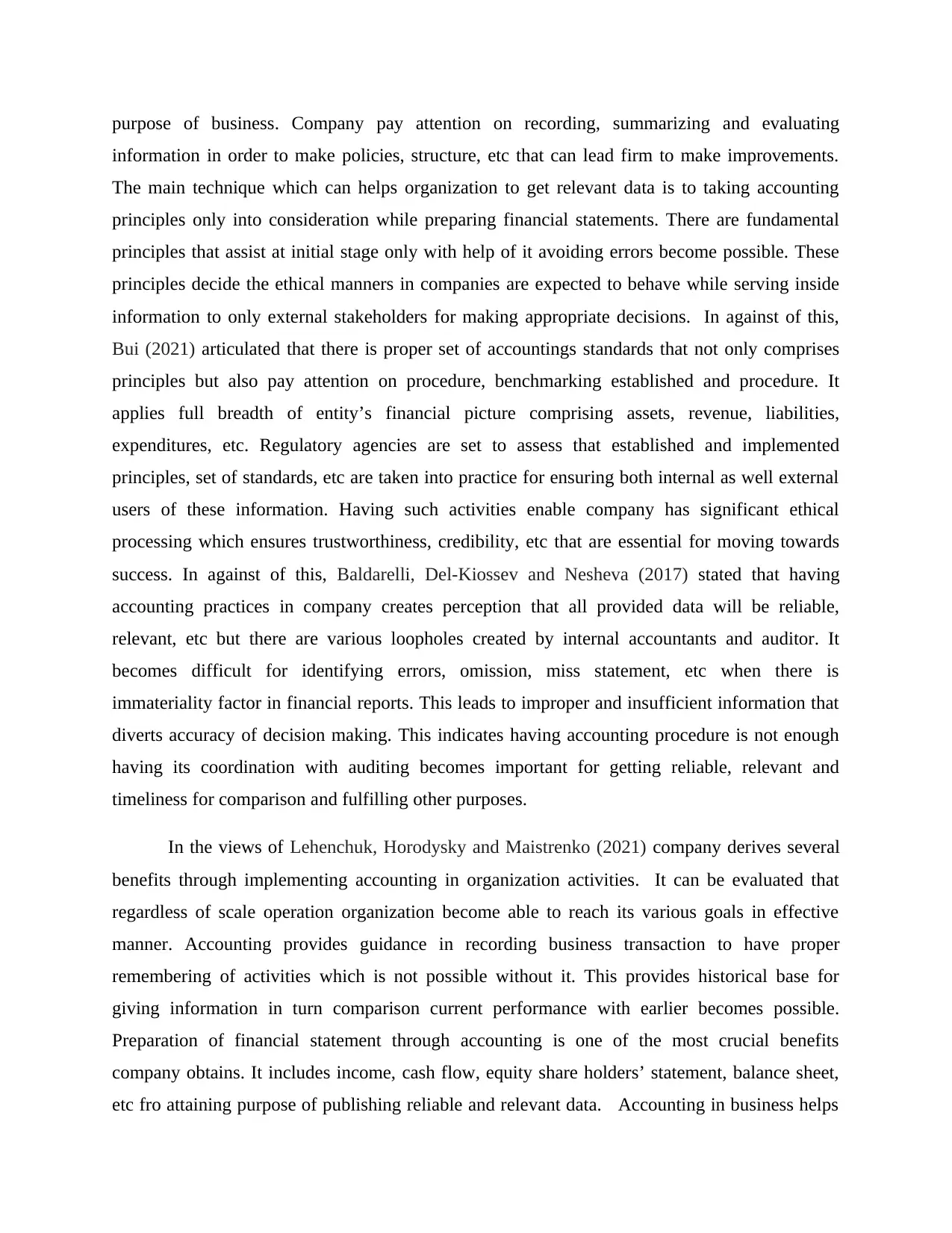
purpose of business. Company pay attention on recording, summarizing and evaluating
information in order to make policies, structure, etc that can lead firm to make improvements.
The main technique which can helps organization to get relevant data is to taking accounting
principles only into consideration while preparing financial statements. There are fundamental
principles that assist at initial stage only with help of it avoiding errors become possible. These
principles decide the ethical manners in companies are expected to behave while serving inside
information to only external stakeholders for making appropriate decisions. In against of this,
Bui (2021) articulated that there is proper set of accountings standards that not only comprises
principles but also pay attention on procedure, benchmarking established and procedure. It
applies full breadth of entity’s financial picture comprising assets, revenue, liabilities,
expenditures, etc. Regulatory agencies are set to assess that established and implemented
principles, set of standards, etc are taken into practice for ensuring both internal as well external
users of these information. Having such activities enable company has significant ethical
processing which ensures trustworthiness, credibility, etc that are essential for moving towards
success. In against of this, Baldarelli, Del-Kiossev and Nesheva (2017) stated that having
accounting practices in company creates perception that all provided data will be reliable,
relevant, etc but there are various loopholes created by internal accountants and auditor. It
becomes difficult for identifying errors, omission, miss statement, etc when there is
immateriality factor in financial reports. This leads to improper and insufficient information that
diverts accuracy of decision making. This indicates having accounting procedure is not enough
having its coordination with auditing becomes important for getting reliable, relevant and
timeliness for comparison and fulfilling other purposes.
In the views of Lehenchuk, Horodysky and Maistrenko (2021) company derives several
benefits through implementing accounting in organization activities. It can be evaluated that
regardless of scale operation organization become able to reach its various goals in effective
manner. Accounting provides guidance in recording business transaction to have proper
remembering of activities which is not possible without it. This provides historical base for
giving information in turn comparison current performance with earlier becomes possible.
Preparation of financial statement through accounting is one of the most crucial benefits
company obtains. It includes income, cash flow, equity share holders’ statement, balance sheet,
etc fro attaining purpose of publishing reliable and relevant data. Accounting in business helps
information in order to make policies, structure, etc that can lead firm to make improvements.
The main technique which can helps organization to get relevant data is to taking accounting
principles only into consideration while preparing financial statements. There are fundamental
principles that assist at initial stage only with help of it avoiding errors become possible. These
principles decide the ethical manners in companies are expected to behave while serving inside
information to only external stakeholders for making appropriate decisions. In against of this,
Bui (2021) articulated that there is proper set of accountings standards that not only comprises
principles but also pay attention on procedure, benchmarking established and procedure. It
applies full breadth of entity’s financial picture comprising assets, revenue, liabilities,
expenditures, etc. Regulatory agencies are set to assess that established and implemented
principles, set of standards, etc are taken into practice for ensuring both internal as well external
users of these information. Having such activities enable company has significant ethical
processing which ensures trustworthiness, credibility, etc that are essential for moving towards
success. In against of this, Baldarelli, Del-Kiossev and Nesheva (2017) stated that having
accounting practices in company creates perception that all provided data will be reliable,
relevant, etc but there are various loopholes created by internal accountants and auditor. It
becomes difficult for identifying errors, omission, miss statement, etc when there is
immateriality factor in financial reports. This leads to improper and insufficient information that
diverts accuracy of decision making. This indicates having accounting procedure is not enough
having its coordination with auditing becomes important for getting reliable, relevant and
timeliness for comparison and fulfilling other purposes.
In the views of Lehenchuk, Horodysky and Maistrenko (2021) company derives several
benefits through implementing accounting in organization activities. It can be evaluated that
regardless of scale operation organization become able to reach its various goals in effective
manner. Accounting provides guidance in recording business transaction to have proper
remembering of activities which is not possible without it. This provides historical base for
giving information in turn comparison current performance with earlier becomes possible.
Preparation of financial statement through accounting is one of the most crucial benefits
company obtains. It includes income, cash flow, equity share holders’ statement, balance sheet,
etc fro attaining purpose of publishing reliable and relevant data. Accounting in business helps
You're viewing a preview
Unlock full access by subscribing today!
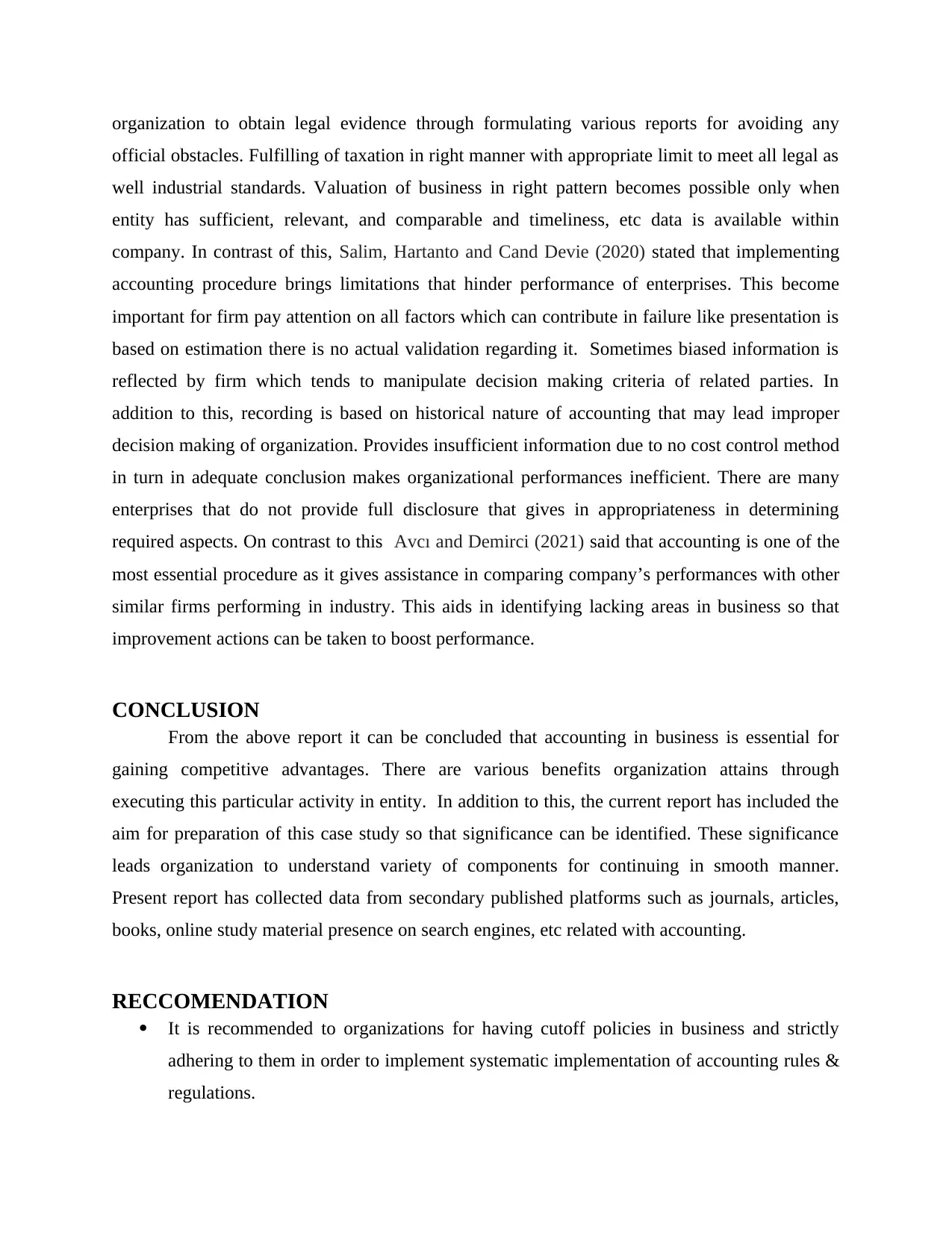
organization to obtain legal evidence through formulating various reports for avoiding any
official obstacles. Fulfilling of taxation in right manner with appropriate limit to meet all legal as
well industrial standards. Valuation of business in right pattern becomes possible only when
entity has sufficient, relevant, and comparable and timeliness, etc data is available within
company. In contrast of this, Salim, Hartanto and Cand Devie (2020) stated that implementing
accounting procedure brings limitations that hinder performance of enterprises. This become
important for firm pay attention on all factors which can contribute in failure like presentation is
based on estimation there is no actual validation regarding it. Sometimes biased information is
reflected by firm which tends to manipulate decision making criteria of related parties. In
addition to this, recording is based on historical nature of accounting that may lead improper
decision making of organization. Provides insufficient information due to no cost control method
in turn in adequate conclusion makes organizational performances inefficient. There are many
enterprises that do not provide full disclosure that gives in appropriateness in determining
required aspects. On contrast to this Avcı and Demirci (2021) said that accounting is one of the
most essential procedure as it gives assistance in comparing company’s performances with other
similar firms performing in industry. This aids in identifying lacking areas in business so that
improvement actions can be taken to boost performance.
CONCLUSION
From the above report it can be concluded that accounting in business is essential for
gaining competitive advantages. There are various benefits organization attains through
executing this particular activity in entity. In addition to this, the current report has included the
aim for preparation of this case study so that significance can be identified. These significance
leads organization to understand variety of components for continuing in smooth manner.
Present report has collected data from secondary published platforms such as journals, articles,
books, online study material presence on search engines, etc related with accounting.
RECCOMENDATION
It is recommended to organizations for having cutoff policies in business and strictly
adhering to them in order to implement systematic implementation of accounting rules &
regulations.
official obstacles. Fulfilling of taxation in right manner with appropriate limit to meet all legal as
well industrial standards. Valuation of business in right pattern becomes possible only when
entity has sufficient, relevant, and comparable and timeliness, etc data is available within
company. In contrast of this, Salim, Hartanto and Cand Devie (2020) stated that implementing
accounting procedure brings limitations that hinder performance of enterprises. This become
important for firm pay attention on all factors which can contribute in failure like presentation is
based on estimation there is no actual validation regarding it. Sometimes biased information is
reflected by firm which tends to manipulate decision making criteria of related parties. In
addition to this, recording is based on historical nature of accounting that may lead improper
decision making of organization. Provides insufficient information due to no cost control method
in turn in adequate conclusion makes organizational performances inefficient. There are many
enterprises that do not provide full disclosure that gives in appropriateness in determining
required aspects. On contrast to this Avcı and Demirci (2021) said that accounting is one of the
most essential procedure as it gives assistance in comparing company’s performances with other
similar firms performing in industry. This aids in identifying lacking areas in business so that
improvement actions can be taken to boost performance.
CONCLUSION
From the above report it can be concluded that accounting in business is essential for
gaining competitive advantages. There are various benefits organization attains through
executing this particular activity in entity. In addition to this, the current report has included the
aim for preparation of this case study so that significance can be identified. These significance
leads organization to understand variety of components for continuing in smooth manner.
Present report has collected data from secondary published platforms such as journals, articles,
books, online study material presence on search engines, etc related with accounting.
RECCOMENDATION
It is recommended to organizations for having cutoff policies in business and strictly
adhering to them in order to implement systematic implementation of accounting rules &
regulations.
Paraphrase This Document
Need a fresh take? Get an instant paraphrase of this document with our AI Paraphraser
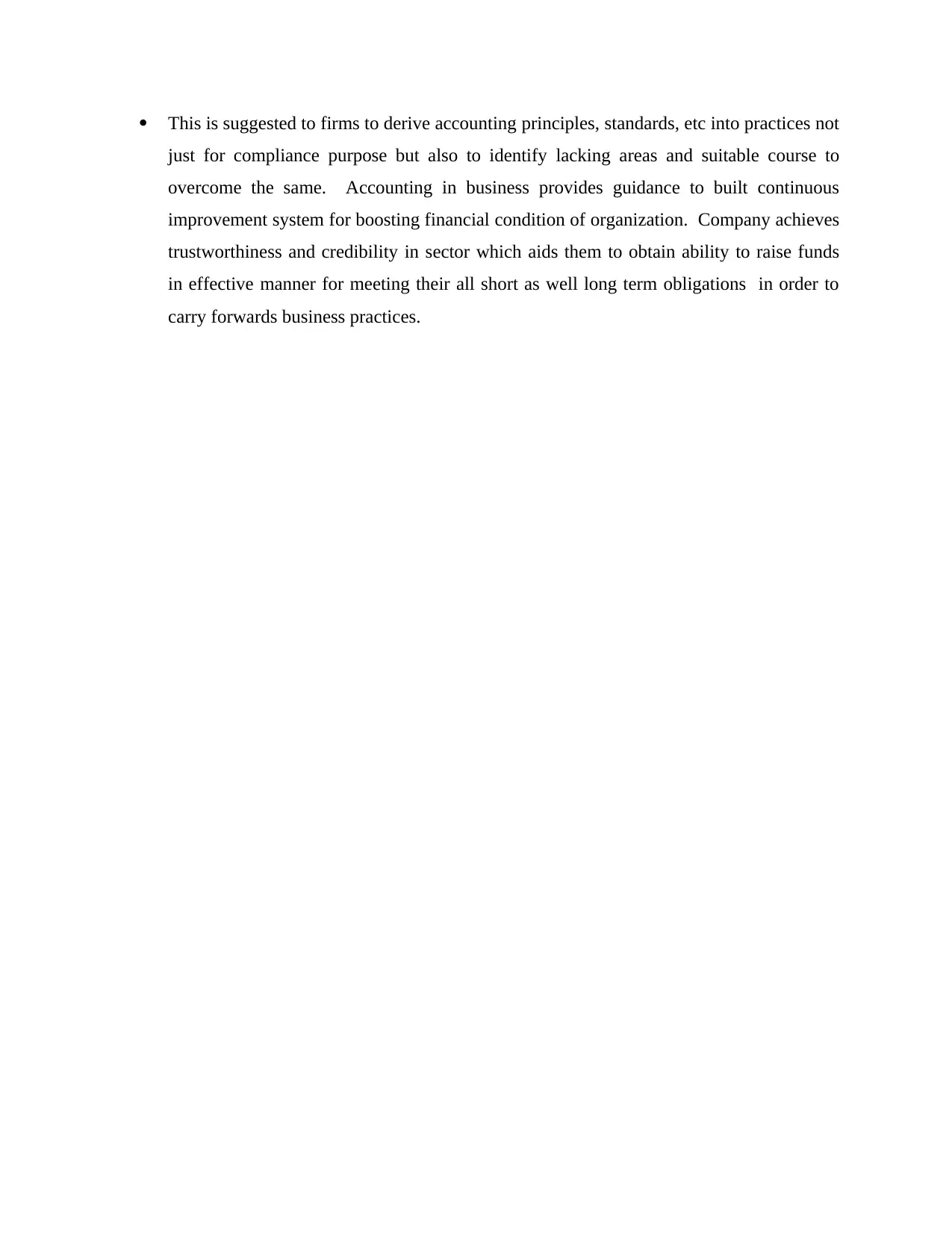
This is suggested to firms to derive accounting principles, standards, etc into practices not
just for compliance purpose but also to identify lacking areas and suitable course to
overcome the same. Accounting in business provides guidance to built continuous
improvement system for boosting financial condition of organization. Company achieves
trustworthiness and credibility in sector which aids them to obtain ability to raise funds
in effective manner for meeting their all short as well long term obligations in order to
carry forwards business practices.
just for compliance purpose but also to identify lacking areas and suitable course to
overcome the same. Accounting in business provides guidance to built continuous
improvement system for boosting financial condition of organization. Company achieves
trustworthiness and credibility in sector which aids them to obtain ability to raise funds
in effective manner for meeting their all short as well long term obligations in order to
carry forwards business practices.
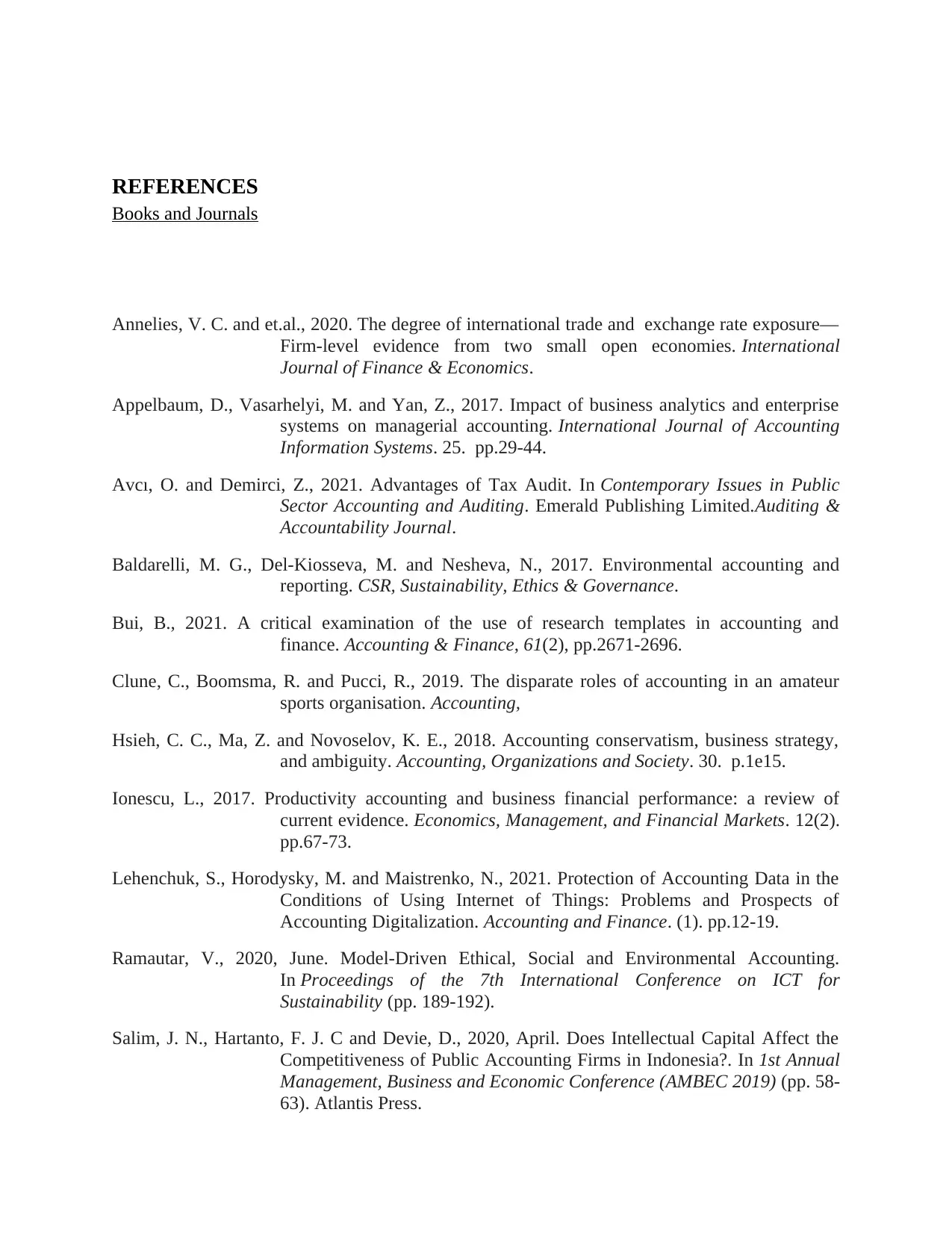
REFERENCES
Books and Journals
Annelies, V. C. and et.al., 2020. The degree of international trade and exchange rate exposure—
Firm‐level evidence from two small open economies. International
Journal of Finance & Economics.
Appelbaum, D., Vasarhelyi, M. and Yan, Z., 2017. Impact of business analytics and enterprise
systems on managerial accounting. International Journal of Accounting
Information Systems. 25. pp.29-44.
Avcı, O. and Demirci, Z., 2021. Advantages of Tax Audit. In Contemporary Issues in Public
Sector Accounting and Auditing. Emerald Publishing Limited.Auditing &
Accountability Journal.
Baldarelli, M. G., Del-Kiosseva, M. and Nesheva, N., 2017. Environmental accounting and
reporting. CSR, Sustainability, Ethics & Governance.
Bui, B., 2021. A critical examination of the use of research templates in accounting and
finance. Accounting & Finance, 61(2), pp.2671-2696.
Clune, C., Boomsma, R. and Pucci, R., 2019. The disparate roles of accounting in an amateur
sports organisation. Accounting,
Hsieh, C. C., Ma, Z. and Novoselov, K. E., 2018. Accounting conservatism, business strategy,
and ambiguity. Accounting, Organizations and Society. 30. p.1e15.
Ionescu, L., 2017. Productivity accounting and business financial performance: a review of
current evidence. Economics, Management, and Financial Markets. 12(2).
pp.67-73.
Lehenchuk, S., Horodysky, M. and Maistrenko, N., 2021. Protection of Accounting Data in the
Conditions of Using Internet of Things: Problems and Prospects of
Accounting Digitalization. Accounting and Finance. (1). pp.12-19.
Ramautar, V., 2020, June. Model-Driven Ethical, Social and Environmental Accounting.
In Proceedings of the 7th International Conference on ICT for
Sustainability (pp. 189-192).
Salim, J. N., Hartanto, F. J. C and Devie, D., 2020, April. Does Intellectual Capital Affect the
Competitiveness of Public Accounting Firms in Indonesia?. In 1st Annual
Management, Business and Economic Conference (AMBEC 2019) (pp. 58-
63). Atlantis Press.
Books and Journals
Annelies, V. C. and et.al., 2020. The degree of international trade and exchange rate exposure—
Firm‐level evidence from two small open economies. International
Journal of Finance & Economics.
Appelbaum, D., Vasarhelyi, M. and Yan, Z., 2017. Impact of business analytics and enterprise
systems on managerial accounting. International Journal of Accounting
Information Systems. 25. pp.29-44.
Avcı, O. and Demirci, Z., 2021. Advantages of Tax Audit. In Contemporary Issues in Public
Sector Accounting and Auditing. Emerald Publishing Limited.Auditing &
Accountability Journal.
Baldarelli, M. G., Del-Kiosseva, M. and Nesheva, N., 2017. Environmental accounting and
reporting. CSR, Sustainability, Ethics & Governance.
Bui, B., 2021. A critical examination of the use of research templates in accounting and
finance. Accounting & Finance, 61(2), pp.2671-2696.
Clune, C., Boomsma, R. and Pucci, R., 2019. The disparate roles of accounting in an amateur
sports organisation. Accounting,
Hsieh, C. C., Ma, Z. and Novoselov, K. E., 2018. Accounting conservatism, business strategy,
and ambiguity. Accounting, Organizations and Society. 30. p.1e15.
Ionescu, L., 2017. Productivity accounting and business financial performance: a review of
current evidence. Economics, Management, and Financial Markets. 12(2).
pp.67-73.
Lehenchuk, S., Horodysky, M. and Maistrenko, N., 2021. Protection of Accounting Data in the
Conditions of Using Internet of Things: Problems and Prospects of
Accounting Digitalization. Accounting and Finance. (1). pp.12-19.
Ramautar, V., 2020, June. Model-Driven Ethical, Social and Environmental Accounting.
In Proceedings of the 7th International Conference on ICT for
Sustainability (pp. 189-192).
Salim, J. N., Hartanto, F. J. C and Devie, D., 2020, April. Does Intellectual Capital Affect the
Competitiveness of Public Accounting Firms in Indonesia?. In 1st Annual
Management, Business and Economic Conference (AMBEC 2019) (pp. 58-
63). Atlantis Press.
You're viewing a preview
Unlock full access by subscribing today!
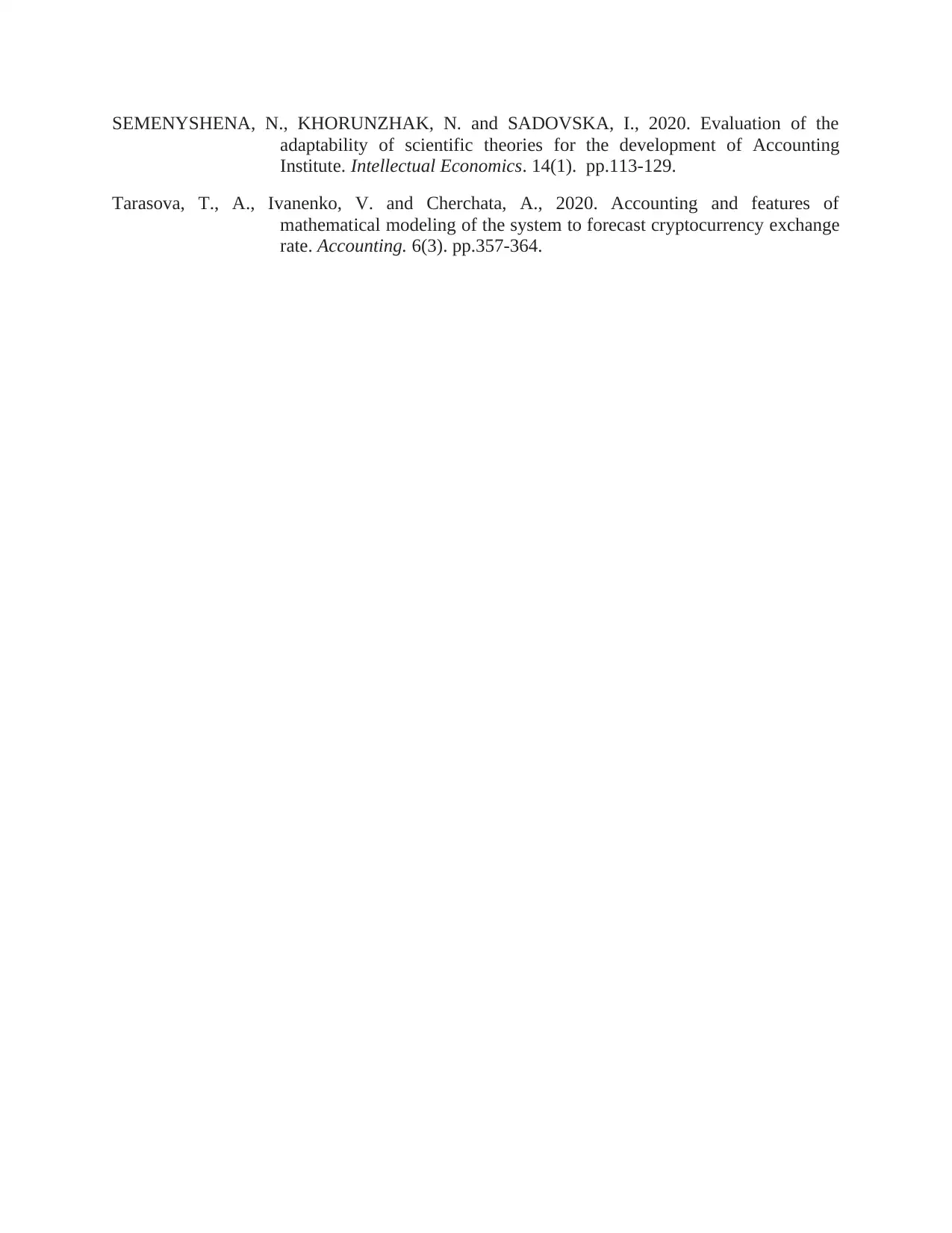
SEMENYSHENA, N., KHORUNZHAK, N. and SADOVSKA, I., 2020. Evaluation of the
adaptability of scientific theories for the development of Accounting
Institute. Intellectual Economics. 14(1). pp.113-129.
Tarasova, T., A., Ivanenko, V. and Cherchata, A., 2020. Accounting and features of
mathematical modeling of the system to forecast cryptocurrency exchange
rate. Accounting. 6(3). pp.357-364.
adaptability of scientific theories for the development of Accounting
Institute. Intellectual Economics. 14(1). pp.113-129.
Tarasova, T., A., Ivanenko, V. and Cherchata, A., 2020. Accounting and features of
mathematical modeling of the system to forecast cryptocurrency exchange
rate. Accounting. 6(3). pp.357-364.
1 out of 10
Related Documents
Your All-in-One AI-Powered Toolkit for Academic Success.
+13062052269
info@desklib.com
Available 24*7 on WhatsApp / Email
![[object Object]](/_next/static/media/star-bottom.7253800d.svg)
Unlock your academic potential
© 2024 | Zucol Services PVT LTD | All rights reserved.




